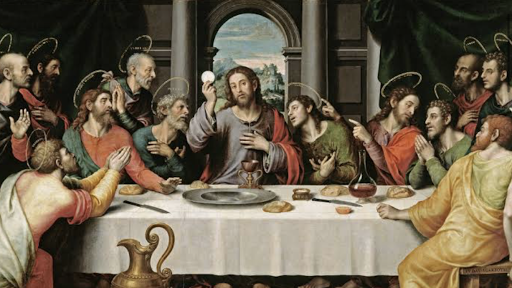The phrase “marriage supper of the lamb” is only mentioned once in the bible. It’s in Revelation 19:9
…Blessed are they which are called unto the marriage supper of the Lamb…
To understand what this is about, we need to understand the nature of the book in which it is mentioned.
Revelation 1:1 states that “the revelation of Jesus Christ” was “signified” unto John.
Signified semaino means to give a sign
A sign that says “Sydney” is not Sydney, rather it points to Sydney.
Thus the book of Revelation contains signs and symbols pointing to spiritual realities.
What do these signs and symbols represent? To find that out we must look at the bible as a whole and allow it to interpret itself.
That’s what I’ve attempted to do in my study of the marriage supper of the lamb. So let’s begin in Exodus.
Exodus 12
5 Your lamb shall be without blemish…
6 … the whole assembly of the congregation of Israel shall kill it in the evening.
7 And they shall take of the blood, and strike it on the two side posts and on the upper door post of the houses, wherein they shall eat it.
8 And they shall eat the flesh in that night, roast with fire, and unleavened bread; and with bitter herbs they shall eat it.
10 And ye shall let nothing of it remain until the morning; and that which remaineth of it until the morning ye shall burn with fire
13 And the blood shall be to you for a token upon the houses where ye are: and when I see the blood, I will pass over you, and the plague shall not be upon you to destroy you, when I smite the land of Egypt.
Note that the Israelites were instructed to consume all of the lamb, “let nothing of it remain”.
Also the blood of the lamb was struck upon the doorposts as a “token” indicating that those abiding in the house, whom had eaten the lamb, should be saved from the coming plague.
John the Baptist, upon seeing Jesus said…
John 1:29
behold the lamb of God which taketh away the sin of the world
Thus Jesus is the lamb we must wholly consume, into our hearts and minds.
His blood, representing his Spirit, is “token” of the fact we have wholly consumed the lamb.
Here are Christ’s own words…
John 6
53 …Except ye eat the flesh of the Son of man, and drink his blood, ye have no life in you.
56 He that eateth my flesh, and drinketh my blood, dwelleth in me, and I in him.
The word Consume means to eat or drink but it also means “to engage fully”.
Consuming the body and blood of Christ means to be fully engaged with Christ. This translates into doing the father’s will as shown in the following verses.
John 4
34 Jesus saith unto them, My meat is to do the will of him that sent me, and to finish his work.
Matthew 26
42 …O my Father, if this cup may not pass away from me, except I drink it, thy will be done.
Now consider..
1 Corinthians 11
29 For he that eateth and drinketh unworthily, eateth and drinketh damnation to himself…
We are not to eat and drink “unworthily” lest we be damned.
To eat and drink “unworthily” is to be a hearer but not a doer of the Word.
Matthew 10
38 And he that taketh not his cross, and followeth after me, is not worthy of me.
To eat and drink “unworthily” is to receive “the grace of God in vain” (2 Cor. 6:1), refusing to follow Christ to the cross.
Hence consuming the body and blood of Christ or doing the father’s will means participating in Christ’s death and resurrection through repentance and rebirth.
Notice how the word consume and consummate sound similar?
The etymology of consume…
altogether- take up
The etymology of the word consummate…
altogether - sum total - brought to completion- completed, accomplished.
Colossians 2
10 And ye are complete in him, which is the head of all principality and power:
We are made complete in Christ through spiritual union with him.
This union is consummated upon us eating his flesh and drinking his blood or participating in his death and resurrection through repentance and rebirth.
Thus the marriage supper of the lamb is a spiritual celebration in which we feast upon the lamb, the lamb being Christ himself.
Christ’s death on the cross was an invitation to enter his love. The greek word for love agape means “love feast” hence we have all been “called” to the marriage supper of the lamb.
We’ve all been called to participate in his death in order to receive life. The question is…what will you do with the invitation?
In conclusion
The marriage supper of the lamb is mentioned in the book of Revelation which is a book of signs and symbols pointing to spiritual realities.
Hence there is no literal table covered in food awaiting us in heaven.
The marriage supper of the lamb is a spiritual feast in which we consume the body and blood of Christ through participation in his death and resurrection.
We participate in his death through a once and for all repentance from sin that we may “drink” of his Spirit, receiving spiritual life.
In doing so we are made “complete in him” as evidenced in Colossians 2.
The words complete and consummate are synonymous. That’s why it’s called a “marriage” supper.
The marriage is consummated upon us wholly consuming “the lamb”, similar to how the Israelites feasted on a lamb at Passover and “let nothing of it remain”.
Jesus said in John 6:56
he that eateth my flesh and drinketh my blood dwelleth in me and I in him
Have you wholly consumed the lamb? Are you doing the fathers will? Have you repented from all known sin? Or…are you a hearer but not a doer of the Word, receiving the grace of God in vain, eating and drinking damnation unto yourself?
We have all been “called” to the marriage supper but it’s up to you how you respond to the invitation.
Let us each work out our own salvation with fear and trembling. God bless.


























